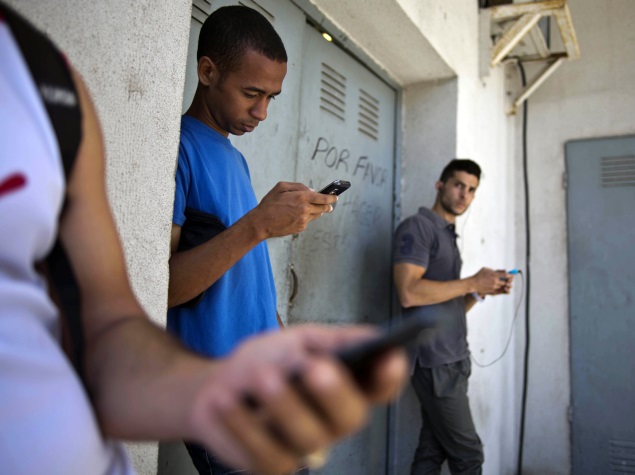- Home
- Telecom
- Telecom News
- Firms Fret as Vietnam Drops Digits to Meet Mobile Phone Demand
Firms Fret as Vietnam Drops Digits to Meet Mobile Phone Demand

Vietnam is ringing in changes next month to make way for a standardized phone numbering plan, but is struggling to get through to businesses hung up on how much it will cost them.
The government abruptly announced changes to millions of phone numbers from March 1, keeping its business community on edge about forking out money to replace everything from shop front signage, banners on trucks and buses, and neon-lit taxi signs to business cards, letterheads, invoices and brochures.
"The cost for fixing the phone numbers is terribly high, but the invisible costs could be higher," said Nguyen Kim Khanh, an executive of Taxi Group, Hanoi's biggest cab company.
Taxi Group will need new signs and stickers on all 2,000 cabs in its fleet, but Khanh's worst fear is that regular clients may forget to update their cellphone address books.
"We're worried about customers who may switch to other cabs if their first call to us cannot connect," she said.
Cellphone usage is rising fast among Vietnam's 90 million population, two thirds of which is under 30. Active mobile numbers grew 12 percent last year to 138 million, reflecting a trend among the Vietnamese of having more than one handset in an expanding economy with a tech-savvy middle class.
(Also See: 4G Networks Rise 36 Percent in 2014; 1800MHz Band Most Popular: Report)
In a country with five mobile phone operators, the change in phone numbers is part of a complex market restructuring process. Authorities say this will standardise existing numbers to make room for future growth, and they have no choice but to act now.
"Over these 50 years, the environment of telecoms business and telecoms technology has changed swiftly," Le Nam Thang, Deputy Minister of Information and Communications, said in a January directive announcing the changes.
All 11-digit mobile numbers are be shortened to 10 digits, with new area codes assigned to 59 of Vietnam's 63 provinces. The old numbers would work for a while during the transition period, but companies are gearing up for a cumbersome exercise.
"It's very much troublesome," said Pham Hai Yen, head of Hanoi's Hai Yen Travel Co, adding firms slow to react could suffer. "Companies are going to lose business advantage."
A separate government project to give each citizen a new identification number by 2020 is already causing bureaucratic headaches. Bank customers complain they're turned away by confused clerks or made to undergo verification procedures because their new ID numbers don't match records.
But the phone number changes are a godsend for Truong Tuan Nghia, whose printing firm is bracing for a deluge of orders.
"This is a huge opportunity for the printing industry," he said.
© Thomson Reuters 2015
Catch the latest from the Consumer Electronics Show on Gadgets 360, at our CES 2025 hub.
Related Stories
- Samsung Galaxy Unpacked 2025
- ChatGPT
- Redmi Note 14 Pro+
- iPhone 16
- Apple Vision Pro
- Oneplus 12
- OnePlus Nord CE 3 Lite 5G
- iPhone 13
- Xiaomi 14 Pro
- Oppo Find N3
- Tecno Spark Go (2023)
- Realme V30
- Best Phones Under 25000
- Samsung Galaxy S24 Series
- Cryptocurrency
- iQoo 12
- Samsung Galaxy S24 Ultra
- Giottus
- Samsung Galaxy Z Flip 5
- Apple 'Scary Fast'
- Housefull 5
- GoPro Hero 12 Black Review
- Invincible Season 2
- JioGlass
- HD Ready TV
- Laptop Under 50000
- Smartwatch Under 10000
- Latest Mobile Phones
- Compare Phones
- Poco X7 Pro 5G
- Poco X7 5G
- Nubia Music 2
- OnePlus 13R
- Moto G05
- Oppo Reno 13F 4G
- Oppo Reno 13F 5G
- Huawei Nova 13i
- Lenovo Yoga Slim 9i (2025)
- Lenovo ThinkPad X9 15 Aura Edition
- Honor Pad X9 Pro
- Honor Pad V9
- Amazfit Active 2
- boAt Enigma Gem
- Sony 65 Inches Ultra HD (4K) LED Smart TV (KD-65X74L)
- TCL 55 Inches Ultra HD (4K) LED Smart TV (55C61B)
- Sony PlayStation 5 Pro
- Sony PlayStation 5 Slim Digital Edition
- Blue Star 1.5 Ton 3 Star Inverter Split AC (IC318DNUHC)
- Blue Star 1.5 Ton 3 Star Inverter Split AC (IA318VKU)

















